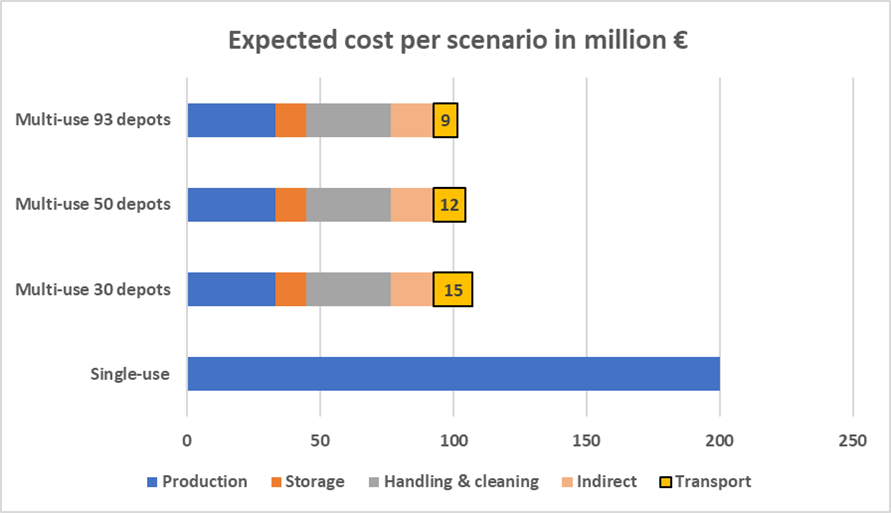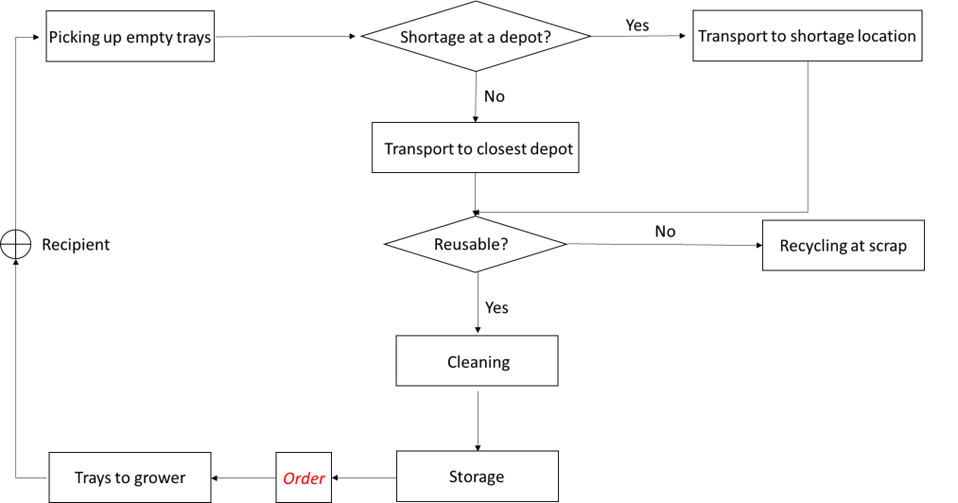Research
Read all about the research we conducted together with the Erasmus University Rotterdam to explore the Reusable Plant Tray.

Just Stop (single-use) Plastic – The Potential of Reusable Plant Tray
Together with the Erasmus University Rotterdam (NL), Envitray conducted academic research (2023) about the potential of a reusable plant tray.
In the European floriculture industry, an estimated 800 million polystyrene plastic plant trays are produced, used and thrown away annually. While the production of the disposable trays has been optimized from a material efficiency perspective, their high production volumes are responsible for over 100,000 tons of toxic waste. Reusable plant trays – made out of HDPE plastic – exist and have the potential to reduce total costs by 50% and total CO2 emissions by over 90% if managed well, while also being better recyclable than polystyrene trays.
Managing the trays is challenging, as activities such as recollection, handling, cleaning, registration and storage must be done efficiently. In addition, the financial and information flows must also be configured next to the physical flow of the trays, and the system requires coordination through a foundation – to invest in the pool of trays.
An academic study by Horvath (2023) designed potential depot networks for recollection and found that the benefits of reusable trays are attainable. While managing the network of multi-use trays is more complex, and requires many participants, single-use trays cannot compete with multi-use trays that last over 50 times longer.
Ultimately, reusable plant trays can be much better for the wallet of the customers, and for the environment than any single-use tray, be it plastic or cardboard. The results are also supported by the findings of Van Paasen & Scholten (2020), who prove that multi-use trays are better for the environment than single-use ones.

Compete or Cooperate – Current and Potential Future State of the Floriculture Industry’s Plant Trays
When one thinks of reusable transport items (RTIs), containers, pallets or boxes might come to mind first. These items have long been widely reused and kept in circulation – drastically reducing the necessary fleet sizes. On the contrary, a widely used item in floriculture logistics – plant trays – are single-use, generating millions of plastic waste annually. Why hasn’t a systematic change occur in this industry yet?
One of the reasons is the fierce competition between plant sellers (growers). There is no overarching cooperation in the market and obtaining information is hindered by participants’ fear of competitors obtaining an advantage. In addition, the current situation benefits the most important actors – auction organizations. As they are a crucial intermediary between sellers and buyers, they earn extra by charging a few cents per tray during the trade. The tray producing businesses also were not incentivized to transfrom the system, as it requires a large investment, which is extremely risky without having knowledge or expertise.
However, a growing number of actors are recognizing the opportunity, such as a multinational cooperation (European Plant Tray), or organizations with expertise in managing RTIs (Envitray). They base their assumptions on research which does indicate that reusable systems can lead to both reduced total costs and pollution levels (Horvath, 2023).
And to see how the circular pooling activities of the reusable trays could look like, the figure below provides an insight.
An academic study by Horvath (2023) designed potential depot networks for recollection and found that the benefits of reusable trays are attainable. While managing the network of multi-use trays is more complex, and requires many participants, single-use trays cannot compete with multi-use trays that last over 50 times longer.
Ultimately, reusable plant trays can be much better for the wallet of the customers, and for the environment than any single-use tray, be it plastic or cardboard. The results are also supported by the findings of Van Paasen & Scholten (2020), who prove that multi-use trays are better for the environment than single-use ones.

